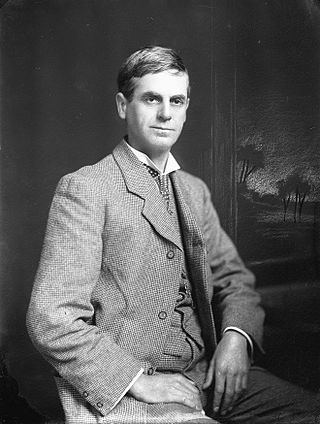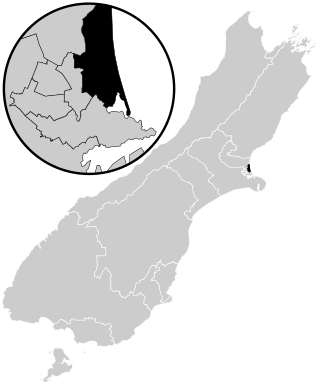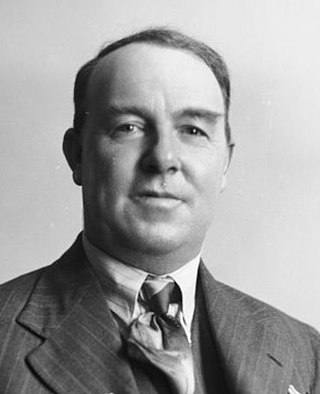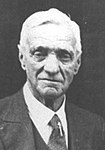
Thomas Edward Taylor was a Christchurch mayor, New Zealand Member of Parliament, businessman and prohibitionist.

Christchurch East, originally called Christchurch City East, is a current New Zealand parliamentary electorate. It was first created for the 1871 election and was abolished for two periods, from 1875–1905 and again from 1946–1996. It was last created for the introduction of the MMP voting system for the 1996 election. The current MP is Reuben Davidson, a member of the New Zealand Labour Party who was first elected in the 2023 New Zealand general election.

Neville George Pickering was a New Zealand politician of the Labour Party.
Avon is a former New Zealand parliamentary electorate. It was created for the 1861 general election and existed until 1996. It was represented by 13 Members of Parliament and was held by Independents, Liberal Party or Labour Party representatives.

Sir Ernest Herbert Andrews was a New Zealand teacher, printer and cricketer and local-body politician. He was on the Christchurch City Council from 1919 and Mayor of Christchurch from 1941 until his retirement in 1950.

John Walton Beanland was a building contractor and Mayor of Christchurch from 1936 to 1938.

The 2010 Christchurch mayoral election is part of the 2010 New Zealand local elections. On 9 October 2010, elections were held for the Mayor of Christchurch plus other local government roles. Incumbent Bob Parker was re-elected.

Melville Edwin Lyons, sometimes called Tiny, was briefly a Reform Party Member of Parliament in New Zealand until his election was declared void. A journalist by trade, he became involved in local politics in Christchurch after having served in WWI. He was Deputy Mayor of Christchurch for six years under mayor Ernest Andrews.

The 1939 Christchurch South by-election held on 3 June was caused by the death of Ted Howard during the term of the 26th New Zealand Parliament. The by-election in the Christchurch South electorate was contested by Robert Macfarlane for Labour and Melville Lyons for National, with Macfarlane winning the election. At the time, Macfarlane was Mayor of Christchurch.

The 1943 Christchurch East by-election held on 6 February was caused by the death of Tim Armstrong during the term of the 26th New Zealand Parliament. The by-election in the Christchurch East electorate was contested by five candidates, including representatives from the Labour Party, the Labour breakaway party Democratic Labour Party and the National Party. The election was won by the Labour candidate, Mabel Howard, and started her long parliamentary career, which included her becoming the first female cabinet minister in 1947.

The 21 June 1875 Wairau by-election was a by-election held in the Wairau electorate in the Marlborough Province during the 5th New Zealand Parliament. The by-election was caused by the resignation of incumbent MP Arthur Seymour and was won by Joseph Ward, who defeated William Sefton Moorhouse. Ward was a well-known politician in Marlborough. Moorhouse had political seniority over Ward and was at the time Mayor of Wellington, but had no personal connection to Marlborough.

The 1935 Christchurch City mayoral election was held on 8 May. The incumbent, Dan Sullivan of the Labour Party narrowly beat the conservative candidate, Hugh Acland, a surgeon and World War I veteran. The election attracted nationwide attention, as Christchurch was a Labour-stronghold and due to Acland's widespread popularity, it was regarded as a test whether Labour could potentially win the November 1935 general election.

The Christchurch mayoral by-election in 1936 was triggered by the resignation of the incumbent, Dan Sullivan, who had been appointed cabinet minister after the Labour Party winning the general election in November 1935. The election was won by John Beanland of the Citizens' Association, who narrowly beat the Labour candidate.

The 1950 Christchurch mayoral election was part of the New Zealand local elections held that same year. In 1950, election were held for the Mayor of Christchurch plus other local government positions. The polling was conducted using the standard first-past-the-post electoral method.

The Christchurch mayoral election held on 27 November 1895 was contested by city councillors Howell Widdowson and Harry Beswick. Both candidates were young solicitors with few prior civic roles. Initially, the incumbent mayor—Walter Cooper—was one of the candidates but he withdrew. Widdowson attracted some controversy over the question whether he put his nomination forward ahead of a more senior city councillor; many voters still expected at the time that a mayoralty should be assigned to the most senior councillor. Another important issue for many voters was that Widdowson was a tee-totaller and was thus regarded as a prohibitionist, with Beswick seen as the representative of the liquor lobby. Beswick won the election with a clear majority and was installed as mayor of Christchurch on 18 December 1895.
The 1958 Christchurch mayoral election was held to elect a successor to Robert Macfarlane who resigned as Mayor of Christchurch upon his selection as Speaker of the New Zealand House of Representatives. The polling was conducted using the standard first-past-the-post electoral method.
The 1959 Christchurch mayoral election was part of the New Zealand local elections held that same year. In 1959, election were held for the Mayor of Christchurch plus other local government positions. The polling was conducted using the standard first-past-the-post electoral method.

The 1971 Christchurch mayoral election was part of the New Zealand local elections held that same year. In 1971, elections were held for the Mayor of Christchurch plus other local government positions. The polling was conducted using the standard first-past-the-post electoral method. The incumbent, Ron Guthrey of the Citizens' ticket, was defeated by the Labour Party candidate Neville Pickering.

The 1938 Christchurch City mayoral election was held on 11 May. The incumbent, John Beanland of the Citizens' Association, failed to get the nomination by his party and the surgeon Dr. John Guthrie was nominated instead. The Labour Party nominated Robert Macfarlane. Both the Labour and conservative candidate had been members of Christchurch City Council for some years. Macfarlane narrowly won the mayoralty.

The 1944 Christchurch City mayoral election was held on 27 May. The incumbent was Ernest Andrews of the conservative Citizens' Association. Andrews was challenged by his predecessor, Robert Macfarlane, of the Labour Party, who had returned from active war service. Andrews won by a large majority.














